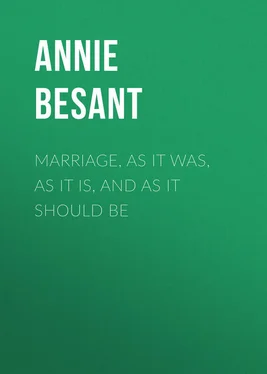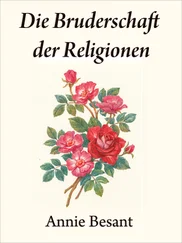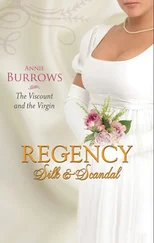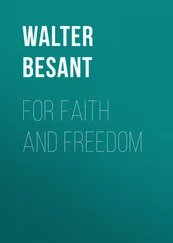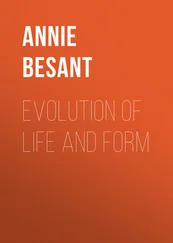Annie Besant - Marriage, As It Was, As It Is, And As It Should Be
Здесь есть возможность читать онлайн «Annie Besant - Marriage, As It Was, As It Is, And As It Should Be» — ознакомительный отрывок электронной книги совершенно бесплатно, а после прочтения отрывка купить полную версию. В некоторых случаях можно слушать аудио, скачать через торрент в формате fb2 и присутствует краткое содержание. Жанр: foreign_antique, foreign_prose, на английском языке. Описание произведения, (предисловие) а так же отзывы посетителей доступны на портале библиотеки ЛибКат.
- Название:Marriage, As It Was, As It Is, And As It Should Be
- Автор:
- Жанр:
- Год:неизвестен
- ISBN:нет данных
- Рейтинг книги:4 / 5. Голосов: 1
-
Избранное:Добавить в избранное
- Отзывы:
-
Ваша оценка:
- 80
- 1
- 2
- 3
- 4
- 5
Marriage, As It Was, As It Is, And As It Should Be: краткое содержание, описание и аннотация
Предлагаем к чтению аннотацию, описание, краткое содержание или предисловие (зависит от того, что написал сам автор книги «Marriage, As It Was, As It Is, And As It Should Be»). Если вы не нашли необходимую информацию о книге — напишите в комментариях, мы постараемся отыскать её.
Marriage, As It Was, As It Is, And As It Should Be — читать онлайн ознакомительный отрывок
Ниже представлен текст книги, разбитый по страницам. Система сохранения места последней прочитанной страницы, позволяет с удобством читать онлайн бесплатно книгу «Marriage, As It Was, As It Is, And As It Should Be», без необходимости каждый раз заново искать на чём Вы остановились. Поставьте закладку, и сможете в любой момент перейти на страницу, на которой закончили чтение.
Интервал:
Закладка:
In an admirable article in the Westminster Review for April, 1876, the following striking passage is to be found:
"As Aristotle long since remarked, among savages women and slaves hold the same rank. Women are bought primarily as slaves, to drudge and toil for their masters, whilst their function as wives is secondary and subordinate. It is more right to say of polygamous people that their slaves are also their wives, than to say that their wives are slaves. They are purchased as slaves, they work as slaves, and they live as slaves. 'The history of uncultivated nations,' it has been said, 'uniformly represents the women as in-a state of abject slavery, from which they slowly emerge as civilisation advances.' In Canada a strap, a kettle, and a faggot are placed in the new bride's cabin, to indicate that it will be henceforth her duty to carry burdens, dress food, and procure wood for her husband. In Circassia it is the women who till and manure the ground, and in parts of China they follow the plough. A Moorish wife digs and sows and reaps the corn, and an Arabian wife feeds and cleans and saddles her master's horse. Indeed, the sole business of Bedouin wives is to cook and work, and perform all the menial offices connected with tent-life… From the absolute power of a savage over his slaves flow all those rights over a woman from which the marital rights of our own time are the genealogical descendants… A trace of it [purchase] is found in the following customs of old English law: – 'The woman at the church-door was given of her father, or some other man of the next of her kin, into the hands of her husband, and he laid down gold and silver for her upon the book, as though he did buy her.'" This custom is still maintained in the Church ritual; the priest asks: "Who giveth this woman to be married to this man?" and when the man gives the ring to the priest, he gives money with it, receiving back the ring to give the woman, but the money remaining, a survival of the time when wives were literally bought.
By the old Roman laws, the married woman had no personal rights; she was but the head slave in her husband's house, absolutely subject in all things to her lord. As the Romans became civilised, these disabilities were gradually removed. It is important to remember these facts, as these are the origin of our own marriage laws, and our common law really grows out of them.
One other point must be noticed, before dealing immediately with the English marriage laws, and that is the influence exerted over them by ecclesiastical Christianity.
The Old Testament expressly sanctions polygamy; but while the New Testament does not proscribe it – except in the case of bishops and deacons – ecclesiastical Christianity has generally been in favour of monogamy; at the same time, both the New Testament and the Church have insisted on the inferiority of the female sex; "the husband is the head of the wife" (Eph. v. 23); "wives, submit yourselves unto your own husbands" (Col. iii. 18); "your women… are commanded to be under obedience" (1 Cor. xiv. 34); "ye wives, be in subjection to your own husbands… even as Sara obeyed Abraham, calling him lord, whose daughters ye are as long as ye do well" (1 Pet. iii. 1, 6). The common law of England is quite in accordance with this ancient Eastern teaching, and regards men as superior to women; "Among the children of the purchaser, males take before females, or, as our male lawgivers, have expressed it, the worthiest of blood shall be preferred" ("Comm, on the Laws of England," J. Stephen, 7th ed. vol. i. p. 402).
The feudal system did much, of course, to perpetuate the subjection of women, it being to the interest of the lord paramount that the fiefs should descend in the male line in those rough ages, when wars and civil feuds were almost perpetual, it was inevitable that the sex with the biggest body and strongest sinews should have the upper hand; the pity is that English gentlemen to-day are content to allow the law to remain unaltered, when the whole face of society has changed.
Let us now turn to the disabilities imposed upon women by marriage.
Blackstone lays down, in his world-famous "Commentaries on the Laws of England," that the first of the "absolute rights of every Englishman" is "the legal and uninterrupted enjoyment of his life, his limbs, his body, his health, and his reputation" (9th ed., bk. 1, p. 129). The second right is personal liberty, and he says: "the confinement of a person in anywise is an imprisonment. So that the keeping; a man against his will in a private house… is an imprisonment" (Ibid, 136): The third is property, "which consists in the free use and enjoyment of all his acquisitions, without any control or diminution, save only by the laws of the land" (Ibid, 138). A subordinate right, necessary for the enforcement of the others, is "that of applying to the courts of justice for redress of injuries." I shall proceed to show that a married woman is deprived of these rights by the mere fact of her marriage.
In the first place, by marriage a woman loses her legal existence; the law does not recognize her, excepting in some few cases, when it becomes conscious of her existence in order to punish her for some crime or misdemeanour. Black-stone says – and no subsequent legislation has in any way modified his dictum: "By marriage the husband and wife are one person in law; that is, the very being or legal existence of the woman is suspended during the marriage, or at least is incorporated or consolidated into that of the husband; under whose wing, protection, and cover , she performs every thing; and is therefore called in our law-French a feme covert" (p. 442). "Husband and wife are one person in law" (Comyn's Digest, 5th ed., vol. ii., p. 208), and from this it follows that "by no conveyance at the common law could the husband give an estate to his wife;" that "a. husband cannot covenant or contract with his wife," even for her own advantage, and that any prenuptial contract made with her as to money she shall enjoy for her separate use after marriage, becomes void as soon as she is married. All covenants for the wife's benefit must be made with some one else, and the husband must covenant with some other man or unmarried woman who acts as trustee for the wife. This is the fundamental wrong from which all the others flow: "'Husband and wife are one person,' and that one is the husband." The wife's body, her reputation, are no longer her own. She can gain no legal redress for injury, for the law does, not recognize her existence except under cover of her husband's suit. In. some cases more modern legislation has so far become conscious of her, as to protect her against her husband, and if this protection separates her from him, it leaves her the more utterly at the mercy of the world.
Читать дальшеИнтервал:
Закладка:
Похожие книги на «Marriage, As It Was, As It Is, And As It Should Be»
Представляем Вашему вниманию похожие книги на «Marriage, As It Was, As It Is, And As It Should Be» списком для выбора. Мы отобрали схожую по названию и смыслу литературу в надежде предоставить читателям больше вариантов отыскать новые, интересные, ещё непрочитанные произведения.
Обсуждение, отзывы о книге «Marriage, As It Was, As It Is, And As It Should Be» и просто собственные мнения читателей. Оставьте ваши комментарии, напишите, что Вы думаете о произведении, его смысле или главных героях. Укажите что конкретно понравилось, а что нет, и почему Вы так считаете.
